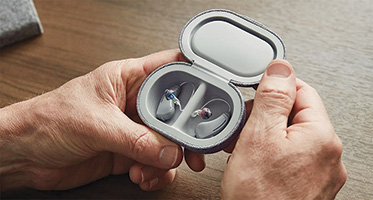 Hearing loss is the third most common chronic physical condition in the U.S. and is twice as prevalent as diabetes or cancer, according to the Centers for Disease Control and Prevention (CDC). In addition, nearly 25 million individuals have experienced tinnitus, which is a ringing or buzzing in the ears.
Hearing loss is the third most common chronic physical condition in the U.S. and is twice as prevalent as diabetes or cancer, according to the Centers for Disease Control and Prevention (CDC). In addition, nearly 25 million individuals have experienced tinnitus, which is a ringing or buzzing in the ears.
Untreated hearing loss is detrimental to a person’s well-being on multiple levels. It can cause concerns, such as communication and relationship issues, social isolation, withdrawal, loneliness, depression, anxiety, and more. A Johns Hopkins study also suggests hearing loss increases the chance of cognitive decline, including dementia.
It is important to see a licensed hearing care professional to rule out any serious medical condition as a cause of hearing loss or tinnitus symptoms.
Many over-the-counter (OTC), online and mail-order hearing devices are hitting the market at record pace, and many have deceiving advertisements. Knowing the facts will help someone navigate their choices.
Nikki RoseRoyce, a board-certified hearing instrument specialist with Miracle-Ear, answered a few questions to help individuals explore hearing solutions.
WHAT SHOULD I KNOW?
OTC hearing devices are only recommended for those with mild hearing loss. They are not a healthy option for higher levels of hearing loss.
Every person’s hearing loss is unique – like a fingerprint. There is no hearing device that offers a one size fits all solution. Hearing aids should protect healthy hearing levels and correct hearing loss. Choosing the wrong device can cause a person’s hearing to further deteriorate.
A good turn of phrase to remember, “clarity in hearing is not always just turning up the volume.” Protecting the hearing a person has left is important. A hearing device that is an amplifier and not a true hearing aid does nothing more than turn up the volume – like turning your car radio or tv volume up.
Considerations such as one’s living environment, the causes of hearing loss, and the different levels of sounds and pitch that are missing are important factors in finding the correct device.
ARE OTC DEVICES EASY TO USE?
If a person has difficulty using an app on a smartphone or needs help from others to navigate smartphone settings, they might do best seeing a licensed professional who can provide personalized services.
A person should ask themselves how comfortable they are with fitting their own devices independently. Hearing devices are normally worn many hours a day, they need to be well-fitted to alleviate rubbing or pressures. Professional practices can provide custom molds and a prescriptive fit to ensure comfort and clarity.
MAINTENANCE AND CLEANING
An important element to consider is aftercare service. The care, cleaning, and maintenance is important for the sound clarity and longevity of any hearing device. At a professional hearing aid practice the aftercare should be included with your purchase for the life of the devices. In most cases, OTC hearing devices do not have service or maintenance included because you are doing that yourself.
Hearing loss can change over time. Yearly evaluations are important to ensure your hearing health and device prescription stays up to date. OTC devices do not come with professional hearing evaluations and have manual settings for the owner to adjust.
A warranty should be included. Professional outlets should also provide loaner hearing aids while yours are out for repair. Be sure to ask about what type of warranty OTC devices provide.
WHY THE PRICE DIFFERENCE?
Deceptive advertising narrative OTC products utilize is the cost difference.
Medical-grade hearing aids vary in price range based upon your specific needs. Most professional practices have options for every budget, including flexible financing.
In fact, entry-level hearing aids are similar in price to the current group of OTC products being offered.
The cost of professional practice hearing aids isn’t just for the devices – it also includes follow-up visits, adjustments, yearly examinations, maintenance and counseling. Unfortunately, insurance companies rarely reimburse those services and OTC purchases rarely provide them.


